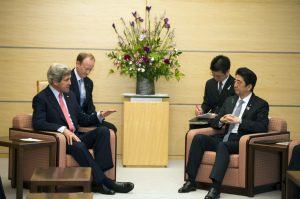
The Yasukuni Shrine is the embodiment of Japan’s military tradition. It is the burial site of more than 2,466,000 soldiers and civilians who died in wars spanning from the Boshin War of 1868 to the end of World War II. The shrine is controversial today because there are buried over 1,000 war criminals, including 13 “Class A” war criminals, from World War II, which included the prime ministers and top generals from the war era. Curiously, when the US military occupation ordered the destruction of the Shinto shrine in an attempt to rid the country of militarist symbols, it was the Roman Catholic Church that saved the shrine. Father Bruno Bitter S.J. of the Roman Curia and Father Patrick Byrne of Maryknoll insisted to General McArthur that honoring their war dead was the right and duty of citizens everywhere. The US military decided on that ground not to destroy the Yasukuni shrine. The Roman Curia reaffirmed the Instruction in 1951.
A little-known background to the Cold War was the role of the Vatican under Pope Pius XII in fostering a “war against Godless communism” which went so far as to manipulate the US Senator Joe McCarthy and to organize the infamous Vatican “rat line” to smuggle leading Nazis out of Europe to South America in hopes of using them against the Soviet Union and China under Mao.
The saving of the Yasukuni Shrine by the Church in the early 1950’s haunts global politics to the present.
Abe, who has pledged to remove Japan’s constitutional prohibition on developing its military actively, has also appointed leading persons to the Japan state TV NHK, who are openly militarist. In January, new NHK Chairman Katsuto Momii, told a news conference that “comfort women” – a euphemism for the mainly Korean and Chinese women forced to work in Japanese wartime military brothels – had counterparts in every country at war at that time. That did not go down well in South Korea where bitter memories remain. Adding to the climate of renewed Japanese militarism is the fact that Abe’s education ministry is planning changes to Japanese textbooks to promote patriotism.
The Cheney link to Abe
What is rarely mentioned about the new militarism from the Abe government is the fact that Abe is not being encouraged by the Obama administration, where relations are chilly at best. Rather the circle of still-influential neo-conservatives around Dick Cheney and the US military establishment have been quietly backing Abe’s aggressive international posture, especially against China on the islands.
Obama policy has been to keep Washington in the Asian power game playing the role as mediator between both China and Japan. Abe clearly does not appreciate the interventions of Vice President Joe Biden who tried to calm the rising military tensions over the islands. When China imposed the air defense identification zone or ADIZ in the East China Sea, Prime Minister Abe lashed out with bellicose “this shall not stand” rhetoric and declared that no Japanese aircraft – including Japanese civilian carriers that had already declared their intention of complying with the Chinese declaration – would respect the ADIZ.
Then at a speech in Davos last month, Abe criticized the Chinese as being aggressive and militaristic, comparing Japan-China relations explicitly to relations between Germany and the UK in 1914.
The key to the new boldness on military issues from Japan comes from a little-known Washington think-tank called the Center for a New American Security. The Center, founded in 2007, is the creation of the military industry hawk lobby and its board includes top people from the world’s largest military corporations including Boeing and Lockheed, Richard Armitage from the Bush-Cheney administration and other hawks. Reacting to Biden’s recent cooling down effort between China and Japan, the Center wrote:
The United States should pursue policies that actually elevate the risks – political, economic, or otherwise – to Beijing of acting assertively… The US military needs capabilities and plans that not only prepare it for major war, but that also offer plausible, concrete options for responding to Chinese attempts to exploit America’s perceived aversion to instability… The United States can further raise the stakes by deepening its military ties with Japan…Senator John McCain, whose confidant Roy Pflauch handles the Abe administration’s careful and extensive informal outreach to the American right wing, also invoked the 1914 analogy during the confirmation hearings for new ambassador to the PRC, Max Baucus…
Then in September, 2013 Prime Minister Abe was invited to give a speech in Washington to the hardline neo-conservative think Tank, Hudson Institute. He was introduced to the group by “Scooter” Libby, the bellicose aide to then Vice President Dick Cheney.
The US military industry has one of the most powerful political lobbies in the world as the stakes for war or peace involve hundreds of billions of dollars in new defense contracts and power unimaginable. Their power has been likened to that of a secret government or a state-within-the state.
The neo-conservative lobby that became infamous during the Cheney-Bush era is still very much embedded in Washington. The Abe militarism is a proxy for their power and influence and clearly Abe takes his cues from them and not from the more mild Obama administration. John McCain, chairman of the CIA-linked National Endowment for Democracy’s Republican Institute, is a leading warhawk and played an active role in the neo-conservative efforts to create a pro-NATO coup in Ukraine along with neo-conservative Assistant Secretary of State Victoria Nuland.
F. William Engdahl is strategic risk consultant and lecturer, he holds a degree in politics from Princeton University and is a best-selling author on oil and geopolitics , exclusively for the online magazine New Eastern Outlook
